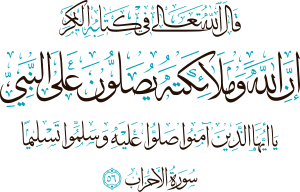Islamic honorifics facts for kids
In Islam, people often use special phrases to show respect and praise. These phrases are used when talking about Allah (God), the Prophet Muhammad, other prophets, or important figures chosen by God. For example, you might hear phrases like Subḥānahu wa-taʿālā (meaning "Glorified and Exalted be He") for God, or ʿalayhi s-salām (meaning "peace be upon him") for prophets.
These respectful phrases are known by different names. For prayers upon Prophet Muhammad, they can be called Arabic: صَلَوات, romanized: ṣalawāt (prayers), Persian: درود, romanized: dorud (greetings), or Urdu: درود, romanized: durūd.
Contents
Showing Respect for God
When Muslims mention one of the names of God, like Allah, they use special phrases to show worship and honor. These are different from the phrases used for people.
- سُبْحَانَهُ وَتَعَالَىٰ (subḥānahu wa-taʿālā)
* Meaning: Glorified and Exalted be He. * Abbreviation: (swt) or (s.w.t.)
- تَبَارَكَ وَتَعَالَىٰ (tabāraka wa-taʿālā)
* Meaning: Blessed and Exalted be He.
- عَزَّ وَجَلَّ (ʿazza wa-jalla)
* Meaning: Prestigious and Majestic be He. * Abbreviation: (azwj) or (a.z.w.j.)
Showing Respect for Prophet Muhammad and His Family
Muslims use specific phrases when mentioning Prophet Muhammad and his family. These phrases show deep respect and love.
- عَلَيْهِ ٱلسَّلَامُ (ʿalayhi as-salāmu)
* Meaning: Peace be upon him. * Usage: This is often used after naming prophets and messengers in Islam and Imams in Shia Islam. * Abbreviation: (as) or (a.s.)
- عَلَيْهِ ٱلصَّلَاةُ وَٱلسَّلَامُ (ʿalayhi ṣ-ṣalātu wa-s-salāmu)
* Meaning: Blessings and peace be upon him. * Usage: Used after naming prophets, messengers, or Imams in Shia Islam. * Abbreviation: (asws), (a.s.w.s.), (pbbuh), (p.b.b.u.h.)
- سَلَامُ ٱللَّٰهِ عَلَيْهِ (salāmu -llāhi ʿalayhī)
* Meaning: Peace of God be upon him. * Usage: Used after naming Imams in Shia Islam or angels. The feminine version (سَلَامُ ٱللَّٰهِ عَلَيْهَا) is used for important women in Islamic history like Fatimah, Khadijah, Maryam, and Asiya. * Abbreviation: (sa) or (s.a.)
- صَلَّى ٱللَّٰهُ عَلَيْهِ وَسَلَّمَ (ṣallā -llāhu ʿalayhī wa-sallama)
* Meaning: Blessings of God be upon him as well as peace. * Usage: This phrase is used specifically after saying the name of Prophet Muhammad. It is very common among Sunni Muslims. * Abbreviation: (saw), (s.a.w.), (sa), (s.a.), (sm)
- صَلَّى ٱللَّٰهُ عَلَيْهِ وَآلِهِ وَسَلَّمَ (ṣallā -llāhu ʿalayhī wa-ʾālihī wa-sallama)
* Meaning: Blessings of God be upon him and his progeny and grant him peace. * Usage: This is also used after mentioning Prophet Muhammad. It is used by all Muslims, but especially by Shia Muslims. * Abbreviation: (saww), (s.a.w.w.), (saws), (s.a.w.s.), (saw), (s.a.w.), (sa), (s.a.), (pbuh), (p.b.u.h)
- صَلَّى ٱللَّٰهُ عَلَيْهِ وَآلِهِ (ṣallā -llāhu ʿalayhī wa-ʾālihī)
* Meaning: Blessings of God be upon him and his progeny. * Usage: Used after mentioning Prophet Muhammad, more commonly by Shia Muslims. * Abbreviation: (sawa), (s.a.w.a.), (saww), (s.a.w.w.), (sa), (s.a.)
- رَحِمَهُ ٱللَّٰهُ (raḥimahu -llāhu)
* Meaning: God have mercy on him. * Usage: Used when mentioning Muslims from history or today who have passed away. * Abbreviation: (ra), (r.a.), (rah), (r.a.h.), (raa), (r.a.a.)
- رَضِيَ ٱللَّٰهُ عَنْهُ (raḍiya -llāhu ʿanhū)
* Meaning: God be pleased with him. * Usage: This phrase is used when mentioning the companions of Muhammad. The feminine version is رَضِيَ ٱللَّٰهُ عَنْهَا. * Abbreviation: (ra), (r.a.)
Sometimes, the phrase Arabic: عليه, romanized: ʿalayhi ("upon him") can be changed to Arabic: عليه وعلى آله, romanized: ʿalayhi wa-ʿalā 'ālihi ("upon him and upon his family") to include the Prophet's family.
While the phrase ṣallā (meaning "blessings") is mostly used for Prophet Muhammad to show his special status, it can technically be used for all prophets.
Why Muslims Use These Prayers for Muhammad
Muslims use these special prayers for Prophet Muhammad because it is mentioned in the Qur'an and in the sayings of the Prophet (called Hadith).
From the Qur'an
The Qur'an, in a chapter called al-Ahzab, tells believers to send blessings upon the Prophet:
إِنَّ ٱللَّٰهَ وَمَلَائِكَتَهُ يُصَلُّونَ عَلَىٰ ٱلنَّبِيِّ يَا أَيُّهَا ٱلَّذِينَ آمَنُوا۟ صَلُّوا۟ عَلَيْهِ وَسَلِّمُوا۟ تَسْلِيمًا
"Surely Allah (God) and His angels bless the Prophet; O you who believe! Send blessings on him and salute him with a (becoming) salutation."
From the Hadith
There are many sayings of Prophet Muhammad that encourage Muslims to send blessings upon him:
- Al-Tirmidhi recorded that Abu Hurairah said Prophet Muhammad mentioned that a person who hears his name and does not send blessings upon him is unfortunate.
- In major hadith collections like Sahih Muslim and Jami' at-Tirmidhi, Abu Hurairah reported that Prophet Muhammad said: "Whoever sends one blessing upon me, Allah will send ten upon him." This means God will bless that person ten times.
- Ahmad ibn Hanbal reported that Prophet Muhammad said that if someone from his community sends blessings upon him, Allah will record ten good deeds for them, remove ten bad deeds, raise their status by ten degrees, and return their greeting.
- Al-Bayhaqi reported that Prophet Muhammad said: "Send the blessings on Allah's messengers and prophets for Allah sent them as He sent me."
- Prophet Muhammad also said: "The miser is the one in whose presence I am mentioned, then he does not send the blessings upon me." This means it's not good to be stingy with blessings.
- Anas bin Malik said: "The Messenger of Allah (PBUH) said: 'Whoever sends salah upon me once, Allah (SWT) will send salah upon him tenfold, and will erase ten sins from him, and will raise him ten degrees in status.'" (Collected by Al-Nasa'i)
Writing Full Phrases for Prophet Muhammad
Some Islamic scholars, like Abd al-Aziz ibn Baz, have advised Muslims to write out the full phrases of blessings for Prophet Muhammad, instead of using short abbreviations like (S) or (SAWS). This is because writing the full phrase helps people remember to say the blessings and fulfills the command from the Qur'an. It also carries more reward.
Showing Respect for Angels and Prophets
Certain respectful phrases are used for important angels like Jibril and Mikhail, as well as for all other Islamic prophets who came before Muhammad, such as Isa (Jesus), Musa (Moses), and Ibrahim (Abraham).
- 'Alay-hi 's-salām (Arabic: عليه السلام)
* Meaning: "Peace be upon him." * Abbreviation: "AS"
- Alaihissalatu Wassalam
* Meaning: "On him are the blessings and the peace of Allah." * Abbreviation: "ASW"
Showing Respect for Muhammad's Companions
Special phrases are used after mentioning the companions (Aṣ-Ṣaẖābah) of Prophet Muhammad. These phrases ask God to be pleased with them.
- Raḍiya 'llāhu 'an-hu (Arabic: رضي الله عنه)
* Meaning: "May Allāh be pleased with him." * Abbreviation: "RA" * Example: "al-'Abbās (Raḍiya 'llāhu 'an-hu) ..."
- Raḍiya 'llāhu 'an-hā (Arabic: رضي الله عنها)
* Meaning: "May Allāh be pleased with her." * Example: "Khadījah (Raḍiya 'llāhu 'an-hā) ..."
- Raḍiya 'llāhu 'an-huma (Arabic: رضي الله عنهما)
* Meaning: "May Allāh be pleased with both of them." * Example: "Umar and Abu Bakr (Raḍiya 'llāhu 'an-huma) ..."
- Raḍiya 'llāhu 'an-hum (Arabic: رضي الله عنهم)
* Meaning: "May Allāh be pleased with them." * Example: "aṣ-Ṣaḥābah (Raḍiya 'llāhu 'an-hum) ..."
Showing Respect for Scholars and Saints
Some phrases are used for highly respected scholars and people who are believed to have a high spiritual status, especially after they have passed away.
* Translation: "May Allah's mercy/blessing be upon him." * Example: "Al Suyuti (Raḥmatu 'llāhi 'alay-hi) ..."
* Translation: "May Allah's mercy/blessing be upon her." * Example: "Fatima al-Fihri (Raḥmatu 'llāhi 'alay-hi) ..."
- Raḥmatu 'llāhi 'alay-him (Arabic: رَحْمَةُ الله عليهم)
* Translation: "May Allah's mercy/blessing be upon them."
If a respected scholar is still alive, different phrases are used:
- Ḥafiḏahu 'llāh (Arabic: حفظه الله)
* Translation: "May Allah preserve him."
- Faraja 'llāhu 'anhu (Arabic: فرج الله عنه)
* Translation: "May Allah grant him relief."
See also
 In Spanish: Honoríficos musulmanes para niños
In Spanish: Honoríficos musulmanes para niños
- Subhanahu wa ta'ala
- Salawat
 | Chris Smalls |
 | Fred Hampton |
 | Ralph Abernathy |







